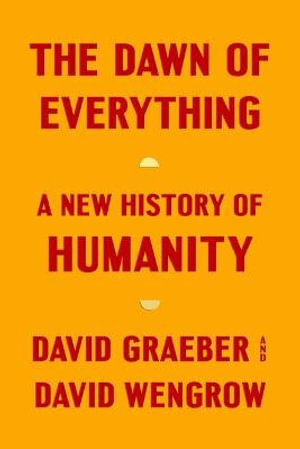 Everything I read, learned and taught about the stone ages and beginnings of civilization was wrong. An anthropologist and an archaeologist have got together to update us all on the discoveries that have been appearing in the scholarly literature over the past sixty years. The findings give great encouragement to those of us who are concerned about humanity’s ability to change course in the interests of our long-term survival.
Everything I read, learned and taught about the stone ages and beginnings of civilization was wrong. An anthropologist and an archaeologist have got together to update us all on the discoveries that have been appearing in the scholarly literature over the past sixty years. The findings give great encouragement to those of us who are concerned about humanity’s ability to change course in the interests of our long-term survival.
I once liked the idea of Rousseau: in our “native state” we are innocent, good; it is the chains that have come with civilization that have degraded us.
But over time I came to fear Hobbes might be more right than I wanted him to be: in our native state our life is “nasty, brutish and short”; it is the controls that civilization has imposed that have obliged us to live according to the “better angels of our nature”.
No. Neither Rousseau nor Hobbes had the right model. We know that people as a whole cannot be lumped under either of the simplistic labels of “good” and “bad”. We can be very, very good and we can be very, very bad. For those of us who see the need for change in the way we live if we are to get through the threats we are facing now of runaway climate change and nuclear war and god knows what else and are keen to join any organized action for a better future, we can take heart from David Graeber and David Wengrow who, in The Dawn of Everything, demonstrate that humanity has done things better in the past and humanity can change.
The Dawn of Everything is one of those books that really does change everything about the way we see ourselves as a species. Several Youtube programs of over an hour length are available for anyone wanting to see the authors’ scholarly peers discussing the book. By bringing together the findings of anthropology and archaeology from the last generation they really are giving the public promise of a new vision. They are not dogmatic about their findings: they simply present the evidence and raise the questions. The rest is up to us.
Luckily I did not know when I opened my electronic copy of the book (one of questionable legal status) that it was over 700 pages long. If I had known that I most likely would have put it aside until I found “the time” to read it. But in Rousseau-like ignorance I undertook my journey and read nothing else for the next two to three days.
Facts:
— Agriculture did not ruin us. We, humans, did not organize ourselves into cities and kings once we “discovered agriculture” and the need for all the land management that is necessary to make it work. Jared Diamond was wrong when he said in Guns, Germs and Steel that agriculture was humanity’s biggest mistake, leading to overcrowded cities and diseases, poverty and the rest.
— There is nothing inevitable about living in a hierarchical or bureaucratic society: people, the same people, have been known to switch on a seasonal basis between highly authoritarian rule and open, small-scale, democratic self-government.
— Big cities are not, by definition, bad: people have created large cities that are non-hierarchical, non-bureaucratic, and open to regional self-government and significant forms of equality. And no poverty.
— Poverty is not inevitable in any society, large or small. It is indeed possible — our experience as a species proves it — to live in a just society without judges, police, jails.
— Steven Pinker’s thesis in The Better Angels of Our Nature was flat wrong. The evidence does not support his view of a relatively violent “pre-civilization” past and a comparatively more peaceful present. In the past there were indeed periods of warfare but there were also very long periods of peace.
— Western civilization as understood according to its historical European base is not the bee’s knees of human accomplishment. We take it for granted that we must study, pass exams in degrees of literature, philosophy, whatever to enter the “public service”. We copied that from the Chinese. We take it for granted that our base-freedoms of liberty equality and fraternity were the products of the European Enlightenment. Rather, European philosophes were inspired — it almost feels like heresy to say it — by “savages” in the New and other worlds they conquered. (For evidence of this claim one can see another work more readily at hand on archive.org: New Worlds for Old : reports from the New World and their effect on the development of social thought in Europe, 1500-1800 (As I said at the beginning, Graeber and Wengrow are not writing a whole lot of new ideas: they are bringing to the public awareness the evidence that has been accumulating in scholarly publications now for the past fifty to sixty years.)
Graeber and Wengrow identify three freedoms that they suggest “make us human”, and three corresponding forms of control that are found in the evidence. They do not say that these are “THE” freedoms of humanity. They acknowledge there may well be others, but for a discussion starter these are the ones they identify: Continue reading “A New History of Humanity — And Hope for Those of Us Who Want It”
